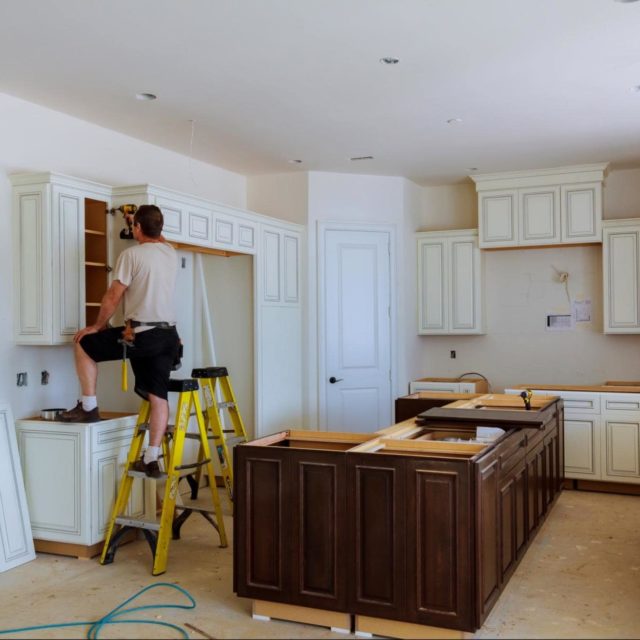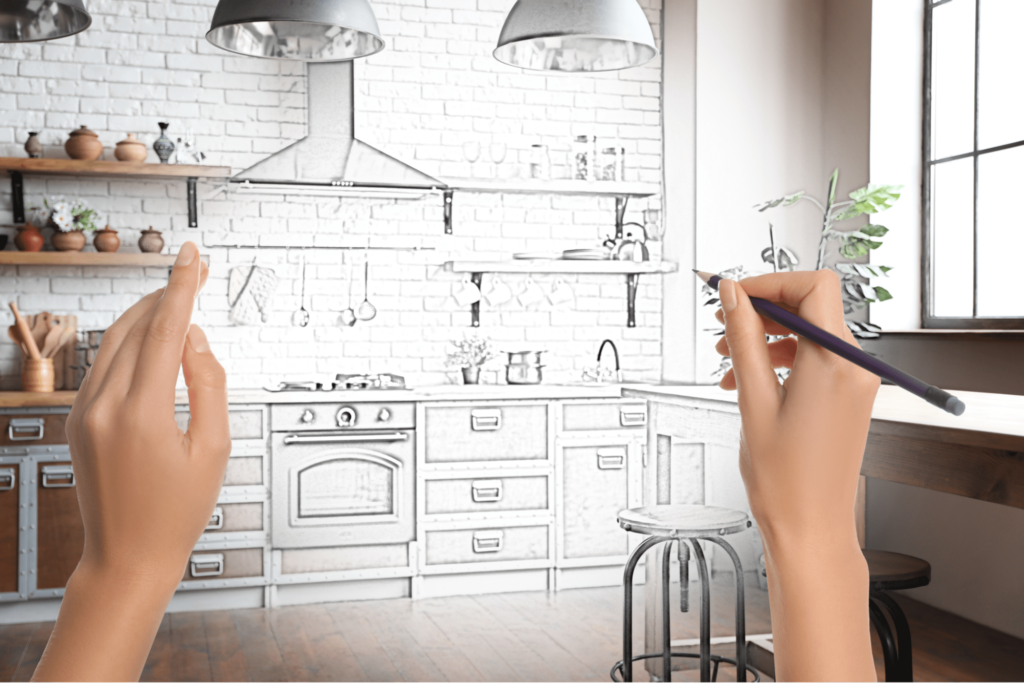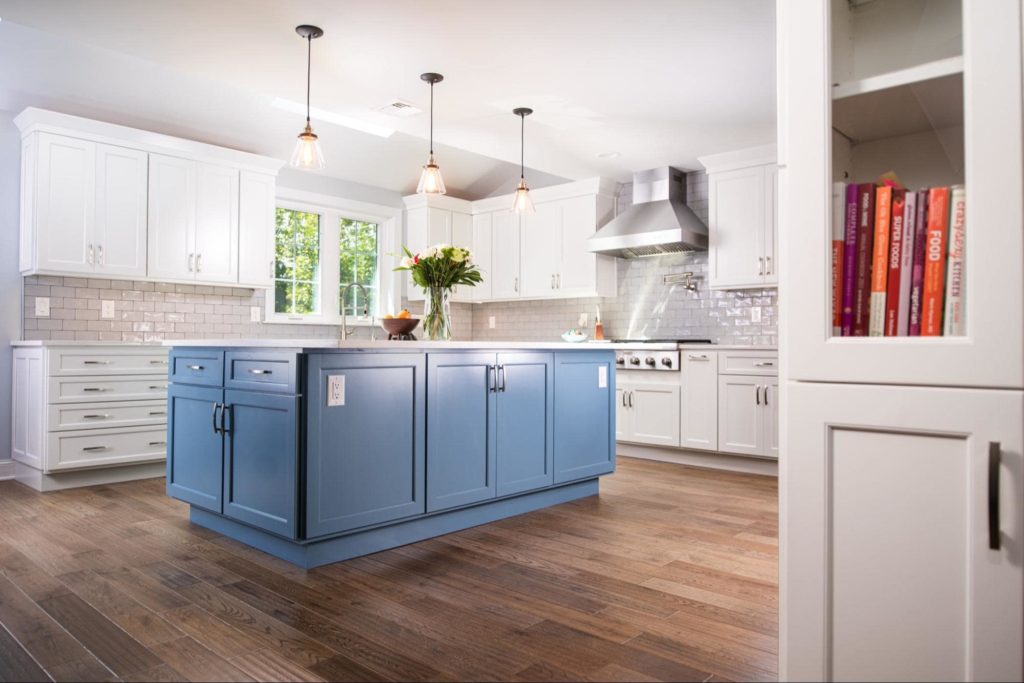How to Prepare for a Kitchen Renovation

- Written by: jlbmdev

A kitchen renovation can be one of the more complex home renovations to take on. Not only do you have to consider how the finished project will look, but you also have to think about space, budget, and contractors. To help you better understand how to prepare for a kitchen renovation without breaking the bank or burning out, this blog will explore how to create a budget, determine the right layout for your home, and partner with a contractor during the process.
We’ve also compiled a fun quiz at the bottom of this blog to help you figure out what type of kitchen may make the most sense for you!
While you’re envisioning your dream kitchen, spend some time researching specific elements that might be important to you. For example, if you love cooking with cast iron but don’t have enough storage space for all your pots and pans, try choosing tall cabinets (also called pantry or utility cabinets).
You may also want to think about how you like to use your kitchen. For instance, do you like to make pancakes every Sunday morning? Do you enjoy entertaining and hosting get-togethers where everyone brings their dish of choice? If so, ample counter space and easy access to outlets (so you can plug in all the necessary appliances for cooking) is an important design element to prioritize.

Many homeowners start remodeling projects with visions of marble countertops, cherry wood cabinets, and stainless steel appliances dancing in their heads. These items are luxuries that may be a nice choice but should be considered upgrades instead of necessities. As you sit down to draw up your budget, be sure to differentiate between what is truly necessary (must-haves) and what is simply desirable (want-to-haves).
For example, granite countertops are a luxury (rather than a necessity) because most people will be just as happy with new options available in laminate surfaces. As best you can, try to avoid keeping up with the Joneses and focus on what makes sense for you, your budget, and the personal functionality of the space.
The kitchen is often one of the most expensive rooms in your home. But this doesn’t mean your remodel has to drive you into debt. Before you dive into the depths of how to prepare for a kitchen renovation, start price-shopping cabinets and countertops. It’s also helpful to sit down with a pen and paper and figure out what kind of budget you’re working with before you wonder how to finance a kitchen remodel.
Figure out how much disposable income (money after taxes) you have every month, then separate that into segments, including your mortgage or rent payment, utilities, and groceries.
Once you have a total number available each month — minus any outstanding debts — it’s time to talk numbers with your building materials supplier and contractor to put together an accurate estimate based on the scope of your project.

Deciding on the right kitchen layout idea is an important part of preparing for a kitchen renovation. You need to determine where your appliances will go, how you’ll store food, and if you’ll have enough room for friends and family when they visit. Partnering with high-quality designers and contractors can help make this part of the planning process much simpler.
As far as appliances go, think about what works best for you and what makes the most sense. Custom-built cabinets may cost more upfront, but they may offer more flexibility and storage options down the road.
Kitchens are one of the first things a buyer looks at in a home, so choosing a layout that makes sense and won’t become outdated in a few years can pay dividends in the future. Also, as more ornate, large kitchens grow in popularity, real estate becomes more expensive, so think about the future if you’re not yet in your forever home.
While you may be tempted to create a kitchen just for you, doing so could affect resale popularity in the future. Be sure that the layout of your kitchen makes sense and isn’t simply artistic for the sake of it.
Before you actually take the steps to remodel your kitchen, take stock of your space. A floor plan will tell you how much room you have in existing cabinets and let you know if any walls need to be knocked down or built up before you can get started.
If your current kitchen doesn’t have much space, a new kitchen remodel layout that features flexible appliances you can tuck under countertops or fold against walls as needed may help. Your appliances are also just as important in determining how big your remodeled kitchen will be. You want pieces that won’t take up too much space, but also don’t limit what else can fit into your kitchen.

When working through the list of how to prepare for a kitchen renovation, finding a kitchen remodeling contractor near you can feel overwhelming. But a quality contractor can be the difference between getting the kitchen of your dreams vs. a remodel that’s more of a nightmare than anything else. To help you in this process, here are a few tips to keep in mind when thinking about how to find a contractor:
There are plenty of ways to save when thinking through how to prepare for a kitchen renovation. However, cutting corners on a contractor shouldn’t be one of them. Below we’ll explore a few common mistakes people often make when choosing a contractor for a kitchen remodel.
You never know when you might start looking to renovate another room of your home. Partnering with people you’ve worked with before can remove a lot of stress and increase job efficiency. To help establish a positive first impression, below are a few ways you can help keep the crew happy and create an atmosphere conducive to excellent work.
With kitchen remodels costing on average between $25,000-$40,000, any way you can cut back can be beneficial. But this doesn’t mean you have to sacrifice everything you want just to stay within budget. There are plenty of tricks for saving money during your kitchen remodel that don’t involve cutting out appliances or knocking down walls.
If you plan, you might be able to secure some matching furniture or countertops that won’t need replacing when the rest of your kitchen does. While a full kitchen renovation often happens all at once, it may be in your best interest to slowly complete one project at a time to look for deals and spread out the cost.
A good contractor is often willing to talk about discounts on labor and materials when they know your project is part of a larger renovation plan. Additionally, contractors may charge less during their slower times of the year. This may mean waiting until summer for contractors in most parts of the country, but winter isn’t necessarily off-limits.
Even with all your planning, it can still feel difficult to figure out where to start and how to determine what style of kitchen will suit you. To help you in this process, we’ve compiled a list of questions that will help you figure out some of the things you’ll need in your new kitchen.
If you answered mostly A’s: Minimal Use Kitchen
We get it. We’re all busy and take-out makes everything so much easier. Basically, you use the kitchen for reheating leftover take-out and sorting your recycling afterward. Even though you rarely use your kitchen, if you plan to sell your home someday, the kitchen might matter a lot more to a buyer than it does to you.
To keep your kitchen modern and attractive to potential buyers, we recommend investing in decent quality appliances, surfaces, and occasional upgrades. Feel free to invest in features that make it more usable for you, such as a multi-function recycling center.
If you answered mostly B’s: Chef-inspired Kitchen
You are a gourmet home cook and you need a kitchen that keeps up with your high standards. Kitchens with commercial-grade appliances, extra prep surfaces, multiple ovens, and versatile cooking options will allow you to create any culinary masterpiece you can imagine.
If you do plan to sell your house in the future, consider that extensive kitchen upgrades might not provide you with the same return on your investment as you paid for in renovations. If you don’t mind that, go ahead and create your culinary paradise!
If you answered mostly C’s: Easy to Use and Easy to Clean Kitchen
Your kitchen personality favors durable, easy-to-clean surfaces and appliances. You prefer little hassle and as little fuss as possible in the kitchen. A kitchen that is convenient, easy to use, and easy to clean will suit you.
There’s no need to spend money on appliances you won’t use. Instead, make the most of your time in the kitchen by adding functionality and simplicity. Quartz or composite counter surfaces may be ideal for you since they don’t need resealing and can withstand heat and stains.